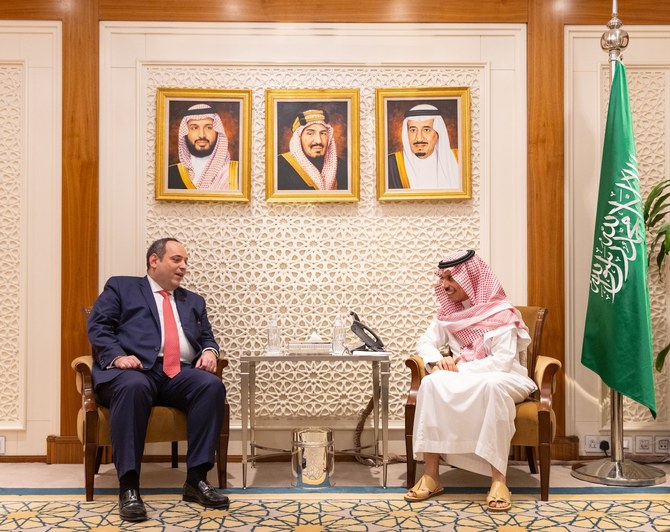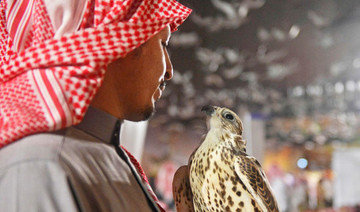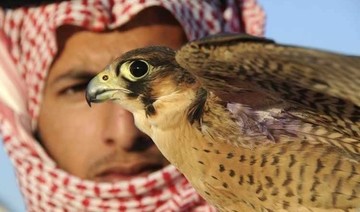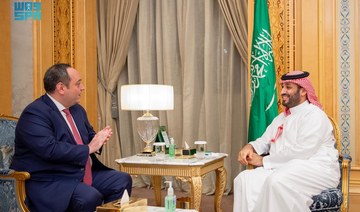JEDDAH: Falcon breeding is an ancient hobby in the Arabian Peninsula, and has spread from Central Asia to Europe. Popular among nobles, falcon breeding played a major role in diplomacy during the Middle Ages. Arab falcon-breeding countries adopt similar breeding and training techniques, except for some specific details.
Training falcons that are less than one year old and making them familiar with their breeders takes up to 40 days; training older ones can take up to a year. Falcons vary in their responsiveness. The peregrine is considered more responsive to training than the lanner, but it is highly susceptible to diseases and has a relatively slow molting process (shedding and renewing feathers). Training falcons requires both modern and traditional methods and equipment, such as binoculars to help locate and follow them, a burqa (leather hood) that covers their head to keep them calm, and a gauntlet (piece of cloth) that is put around the hand.
Falcons are carried on the left hand as it moves less than the right one. They accompany their breeders to become familiar with their voices and able to answer to a specific name. Recently, small drones containing prey in a cage have started being used to train falcons to hunt. Once training is complete, the breeder must be confident that the falcon will always return to them.
Falconry in the Arab world uses different techniques than in Europe, but some details, such as traditional training equipment, are the same. Due to environmental crises, falcons are now kept in private bird sanctuaries where they are raised, trained and bred.
In Belgium, falcons are usually left free to nest next to humans and adapt to their environment. Falcon breeders and hunters in the UK are free to pursue their hobby without the need for a license, provided that they commit to relevant regulations.
In Europe, the rich were not the only people to own falcons; workers used them to search for food. During World War II, falcons were used to kill pigeons carrying messages and prevent collisions between birds and aircraft at and near airports.
Falcons are among the strongest and most popular predatory birds, characterized by their sharp eyesight and claws. Their great hunting ability is what led humans to start using them. Their height varies between 25cm and 75cm, and they weigh 2 kg. Female falcons are bigger than the males. Falcons nest in rocky reefs, trees or on the ground, and generally build their nests with sticks, though some use small branches.
Due to the strong link between falcons and Saudi culture and history, King Salman issued an order in 2017 to establish the Saudi Falcons Club, which cares for falcons as they are considered a national cultural heritage.
It seeks to introduce, highlight and spread this heritage, organize events in the Kingdom and abroad, arrange auctions to sell falcons, and manage sites and reserves that contain them. The club works with universities, scientific centers and health institutions to conduct research and studies.
Falcon breeding played key role in Arab world
Falcon breeding played key role in Arab world

- Falcons are carried on the left hand as it moves less than the right one. They accompany their breeders to become familiar with their voices and able to answer to a specific name
Saudi Justice Ministry to host training conference

RIYADH: The Saudi Ministry of Justice is to hold the International Conference of Judicial Training in Riyadh from May 6-7.
The Judicial Training Center hosts the event which will see the participation of several international training institutes, centers, and experts in the field of judicial and legal training. The objective is to facilitate the exchange of experiences and deliberations on contemporary trends in the era of digital transformation.
Called “The Future of Judicial Training in the Era of Digital Transformation,” the event will delve into the prospects of training in the future. It will explore paths for enhancing training content; strategies for harnessing modern technology; artificial intelligence in judicial training; and effective methodologies for measuring the training’s impact.
Saudi energy minister attends Tashkent International Investment Forum

TASHKENT: Saudi Minister of Energy Prince Abdulaziz bin Salman on Thursday participated in the primary dialogue session at the third Tashkent International Investment Forum.
In the presence of the president of Uzbekistan Shavkat Mirziyoyev, the energy minister highlighted the distinguished relations between the two nations, emphasizing the leadership’s strong commitment to enhancing and expanding cooperation across all sectors, particularly energy.
The partnership aims to benefit both countries and their citizens.
Who’s Who: Ali Alhasan, CEO and founder of NanoPalm

- Alhasan co-developed deep tech to leverage large language models for biotech discovery
- He was granted the Outstanding Researcher Award from the International Institute for Nanotechnology in 2012
Ali Alhasan is CEO and founder of the company NanoPalm. He holds a Ph.D. in nanomedicine, with expertise in nano-drug delivery and gene therapy and five years of experience in executive management.
In his role as CEO, Alhasan formulates the strategic and business plans for accelerating therapy translation globally and trains talents in deep tech, nanotech, and gene editing tech.
Alhasan co-developed deep tech to leverage large language models for biotech discovery. He also co-invented Nanopalm’s biorobots for the delivery of gene editing primers and helped discover four nanomedicines for four different genetic diseases.
He is also an associate professor at King Abdulaziz City for Science and Technology and an adjunct professor at Alfaisal University, establishing collaboration agreements between the two.
As associate professor, he is the principal researcher for development and innovation in nanomedicine and the fourth industrial revolution.
In his role as adjunct professor, Alhasan teaches nanomedicine and mentors postgraduate and undergraduate students. He also co-established the Cancer Nanoscience Program.
Previously, Alhasan served in executive leadership roles at KACST as deputy at the Joint Centers of Excellence Program (2021), deputy of the Life Science and Environment Research Institute (2020), director of the Center of Excellence for Biomedicine (2020), and director of Strategic Initiatives (2016).
Alhasan was a post-doctoral scholar at the University of California in 2015 and received his Ph.D. in the Interdepartmental Biological Sciences Program from Northwestern University in 2013.
In 2008, he received a master’s degree in biotechnology also from Northwestern University, while in 2001, he received his bachelor’s degree in medical technology from King Abdulaziz University.
Alhasan was granted the Leader of the Year award from the Ministry of Communication and Information Technology in 2024. In 2018, he received the Outstanding Investigator Award from KACST.
He was granted the Outstanding Researcher Award from the International Institute for Nanotechnology in 2012.
Prince Faisal bin Farhan speaks with Swiss foreign minister

- two ministers discussed developments of common interest and efforts made by both countries in those areas
RIYADH: Saudi Foreign Minister Prince Faisal bin Farhan spoke on the phone with his Swiss counterpart Ignazio Cassis on Thursday.
During the call, the two ministers discussed developments of common interest and efforts made by both countries in those areas, Saudi Press Agency reported.
Cassis was in the Kingdom last month to attend the Special Meeting of the World Economic Forum held in Riyadh on April 28 and 29, during which he met with Prince Faisal.
Prince Faisal and Cassis also met earlier in the year in February during UN meetings in Geneva.
Saudi FM discusses preparations for Expo 2030 with BIE chief

- During the meeting, the two officials discussed the Kingdom’s preparations to host Expo 2030 in Riyadh
- “We underlined the importance of careful planning to deliver a transformational World Expo in 2030,” Kerkentzes said
RIYADH: Saudi Foreign Minister Prince Faisal bin Farhan received the Secretary-General of the Bureau International des Expositions Dimitri Kerkentzes in Riyadh on Thursday.
During the meeting, the two officials discussed the Kingdom’s preparations to host Expo 2030 in Riyadh and coordination to ensure that the exhibition would be “exceptional,” Saudi Press Agency reported.
Writing on social media platform X, Kerkentzes said: “We underlined the importance of careful planning to deliver a transformational World Expo in 2030.”
The BIE chief met with Crown Prince Mohammed bin Salman on Wednesday.
World Expo 2030 will be hosted in Riyadh after the Kingdom defeated challenges from South Korea and Italy to host the prestigious event in November 2023.



















